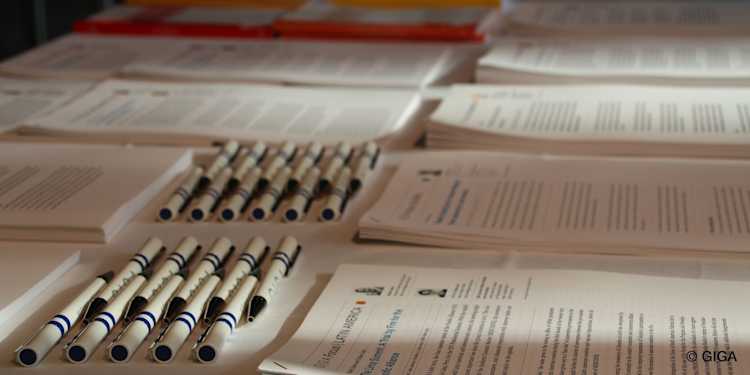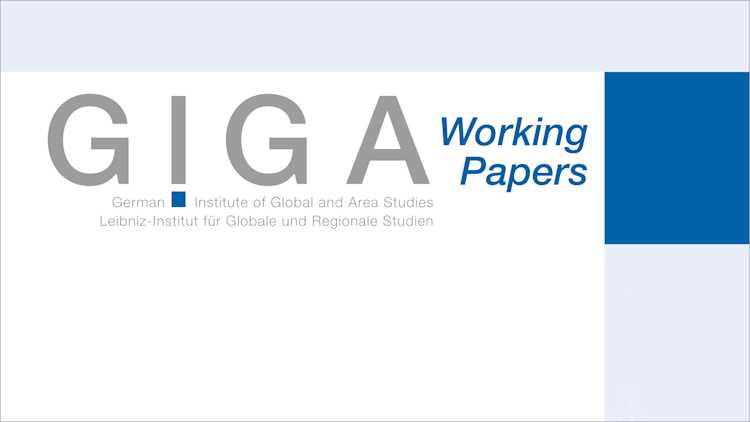- Home
- Publications
- GIGA Focus
- Syria: Power Sharing as an Alternative to Regional Conflagration
GIGA Focus International Edition English
Syria: Power Sharing as an Alternative to Regional Conflagration
Number 9 | 2013 | ISSN: 2196-3940
On 21 August 2013, an estimated 1,400 people died in a poison gas attack in the Suburbs of the Syrian capital Damascus. As a result, the United States and its allies were faced with the decision of whether to use direct military intervention in Syria, 30 months after the outbreak of the uprising and two years after it had escalated into bloody civil war.
Analysis
An external military strike against the Syrian regime would have permanently shifted the complex nexus of local, regional and international actors and interests in Syria. Such an action would have been unlikely to resolve the conflict, but would have quite possibly exacerbated it.
In the third year of the uprising in Syria, there is no sign of a solution. Neither the regime nor the broad spectrum of opposition forces appears capable of winning this destructive power struggle. There are strong indications that there will (almost)only be losers in the end.
There are numerous external actors involved in the Syrian conflict who financially, diplomatically and militarily support either the regime or the various Opposition camps. This is what saw the initial insurrection turn into a civil war; and the civil war,into a proxy war. Today, Syria is center stage of the struggle for the reconfiguration of the Middle East after the Arab Spring.
An alternative to military intervention would be to exert political pressure on the participants to resolve their conflict through nonmilitary means and to develop a negotiated power-sharing arrangement.
The accession of Syria to the Chemical Weapons Convention on 14 October 2013 has presented an opportunity for further negotiated solutions by bringing the previously isolated Bashar al-Assad regime back to the international negotiating table. Now, regional and international actors must push both the regime and the opposition to engage in serious talks. Achieving this in the context of Geneva II negotiations (for which have been scheduled for 22 January 2014) may be unrealistic considering the extensive preconditions of both sides. Without a negotiated compromise, however, the most likely outcome will be regional conflagration.
Footnotes
Regional Institutes
Research Programmes
How to cite this article
Rosiny, Stephan (2013), Syria: Power Sharing as an Alternative to Regional Conflagration, GIGA Focus International Edition English, 9, Hamburg: German Institute for Global and Area Studies (GIGA), http://nbn-resolving.de/urn:nbn:de:0168-ssoar-367679
Imprint
The GIGA Focus is an Open Access publication and can be read on the Internet and downloaded free of charge at www.giga-hamburg.de/en/publications/giga-focus. According to the conditions of the Creative-Commons license Attribution-No Derivative Works 3.0, this publication may be freely duplicated, circulated, and made accessible to the public. The particular conditions include the correct indication of the initial publication as GIGA Focus and no changes in or abbreviation of texts.
The German Institute for Global and Area Studies (GIGA) – Leibniz-Institut für Globale und Regionale Studien in Hamburg publishes the Focus series on Africa, Asia, Latin America, the Middle East and global issues. The GIGA Focus is edited and published by the GIGA. The views and opinions expressed are solely those of the authors and do not necessarily reflect those of the institute. Authors alone are responsible for the content of their articles. GIGA and the authors cannot be held liable for any errors and omissions, or for any consequences arising from the use of the information provided.





